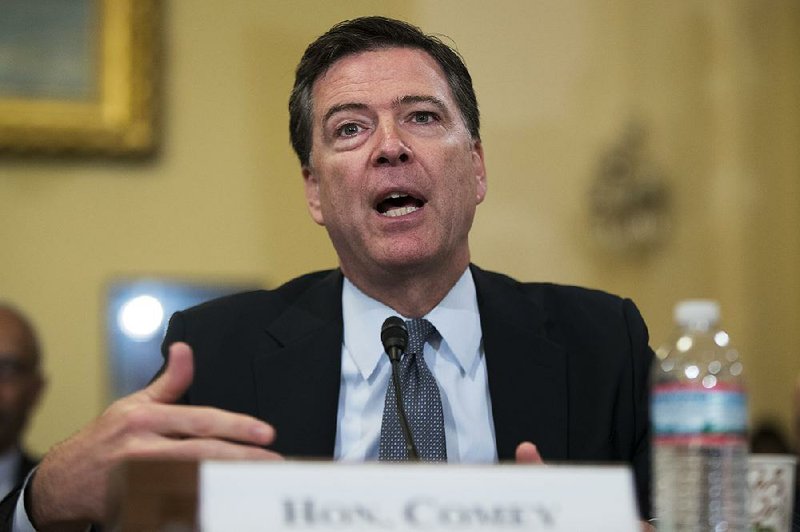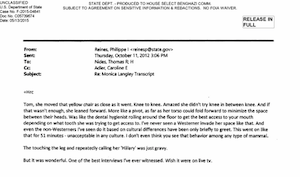WASHINGTON -- The day before FBI Director James Comey sent a letter to Congress announcing that new evidence had surfaced that is possibly related to the earlier Hillary Clinton email investigation, the Justice Department strongly discouraged the step and told him the letter would be breaking with long-standing policy, three law enforcement officials said Saturday.
RELATED ARTICLE
http://www.arkansas…">Clinton blasts Comey; rival says told you
Senior Justice Department officials did not move to stop him from sending the letter, officials said, but they did everything short of it, pointing to policies against talking about current criminal investigations or being seen as meddling in elections.
"Director Comey understood our position. He heard it from Justice leadership," said one Justice Department official who spoke on the condition of anonymity to describe the high-level conversations. "It was conveyed to the FBI, and Comey made an independent decision to alert ... [Capitol] Hill. He is operating independently of the Justice Department. And he knows it."
That Comey moved ahead despite those protestations underscores the unusual nature of Friday's revelations, which added a twist to the final days of a presidential campaign. His action also reignited an issue that Clinton thought she had put behind her when the FBI decided in July not to charge anyone in the investigation of her use of a private email server while secretary of state. Comey's letter did not reopen that inquiry, which centered on the handling of classified information.
[INTERACTIVE: 2016 election coverage]
Senior Justice Department officials, career prosecutors and even some in the FBI were at a loss Saturday as to what would happen next. Would Comey provide a blow-by-blow accounting of the FBI's steps until Election Day? Did he plan further announcements? Or did he intend, after shaking up the election with his letter, to remain silent about the facts until the presidential votes had been tallied? The FBI offered no comment, and Justice Department officials said they had no idea what Comey saw as his next move.
Justice Department officials were particularly puzzled about why Comey had alerted Congress -- and by extension, the public -- before agents even began reading the newly discovered emails to determine whether they contained classified information or added new facts to the case.
The letter to Congress was sent after the discovery of a new trove of emails in an investigation of former U.S. Rep. Anthony Weiner, D-N.Y. -- federal officials are reviewing sexually suggestive online messages that Weiner allegedly exchanged with a teenage girl -- and it opened Comey up to fierce criticism not only from Democrats but also from current and former officials at the FBI and the Justice Department, including Republicans.
"There's a long-standing policy of not doing anything that could influence an election," said George Terwilliger III, a deputy attorney general under President George H.W. Bush. "Those guidelines exist for a reason. Sometimes, that makes for hard decisions. But bypassing them has consequences."
He added, "There's a difference between being independent and flying solo."
The letter is also the latest example of an at-times strained relationship between the Justice Department and Comey, who technically answers to the attorney general but who -- on issues of race, encryption, policing and, most notably, the Clinton investigation -- has branded himself as someone who operates outside Washington's typical chain of command.
After hearing the Justice Department's concerns, Comey concluded that the ramifications of not telling Congress promptly about the new emails far outweighed concerns about the department guidelines, one senior law enforcement official said.
In a memo explaining his decision to FBI employees soon after he sent his letter to Congress, Comey said he felt "an obligation to do so given that I testified repeatedly in recent months that our investigation was completed."
"Of course, we don't ordinarily tell Congress about ongoing investigations, but here I feel I also think it would be misleading to the American people were we not to supplement the record," Comey wrote to his employees.
Under Justice Department policy, restated each election cycle, politics should play no role in any investigative decisions. In Democratic and Republican administrations, Justice Department officials have interpreted that policy broadly, to cover any steps that might give even an impression of partisanship.
"We must be particularly sensitive to safeguarding the department's reputation for fairness, neutrality and nonpartisanship," the deputy attorney general, Sally Yates, wrote in a memo this year offering the latest statement of the policy.
After reports surfaced late last month that Weiner -- who resigned from Congress in 2011 and abandoned a run for mayor of New York in 2013 because of previous "sexting" scandals -- had sent text messages to a 15-year-old girl in North Carolina, top prosecutors in Charlotte and Manhattan jockeyed for the case. Senior officials in the Justice Department decided that if there were a prosecution, it would take place in New York under the supervision of the U.S. attorney there, Preet Bharara.
About the same time, agents in the FBI's New York field office understood that the Weiner investigation could possibly turn up more emails related to Clinton's private server, according to a senior federal law enforcement official. Weiner's estranged wife, Huma Abedin, is a top adviser to Clinton.
On Oct. 3, the FBI seized several electronic devices, including a laptop, Weiner's iPhone and an iPad that was in large measure used by his 4-year-old son to watch cartoons, a person with knowledge of the matter said. Days later, FBI agents also confiscated a Wi-Fi router that could identify any other devices that had been used, the person said.
During the course of searching the seized devices, the FBI discovered thousands of emails, according to senior law enforcement officials, some of them sent between Abedin and other Clinton aides. Agents and prosecutors in the Clinton investigation could not immediately read those emails without court authority, however.
They have begun the process to get that authority, officials said. How soon they will get that and begin reading the emails is unclear, but there is no chance the review will be completed before Election Day, several law enforcement officials said.
Many of the emails are expected to be duplicates of emails that have already been scrutinized in the Clinton case. The government has not yet concluded that the new emails contain classified information, but investigators felt obligated to look.
On Friday, Comey sent the letter to Congress, which said emails had surfaced in a case unrelated to the Clinton case. Comey said the FBI would review the emails to determine if they improperly contained classified information, adding that the emails "appear to be pertinent."
The last time Comey found himself in the campaign spotlight was in July, when he announced that he had finished a monthslong investigation into whether Clinton mishandled classified information through the use of a private email server and recommended that no charges were warranted.
After he did so, the denunciation was loudest from Republican nominee Donald Trump and his supporters, who accused Comey of bias in favor of Clinton's candidacy. There was also grumbling within FBI ranks, with a largely conservative investigative corps saying privately that Comey should have tried harder to make a case.
Comey testified under oath in July before the House Oversight and Government Reform Committee that the FBI was finished investigating the Clinton email matter and that there would be no criminal charges. Comey was asked at the hearing whether he would review any new information the FBI came across.
"My first question is this, would you reopen the Clinton investigation if you discovered new information that was both relevant and substantial?" Rep. Lamar Smith, R-Texas, asked Comey during the hearing.
"It's hard for me to answer in the abstract," Comey replied at the hearing. "We would certainly look at any new and substantial information."
Information for this article was contributed by Matt Apuzzo, Michael S. Schmidt, William K. Rashbaum and Adam Goldman of The New York Times; by Chris Strohm, Billy House and Margaret Talev of Bloomberg News; and by Sari Horwitz of The Washington Post.
A Section on 10/30/2016

